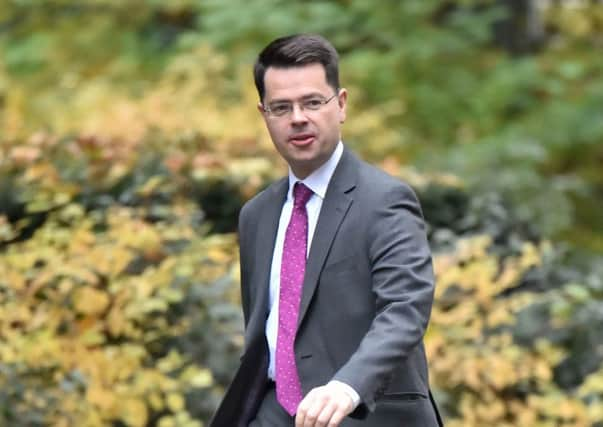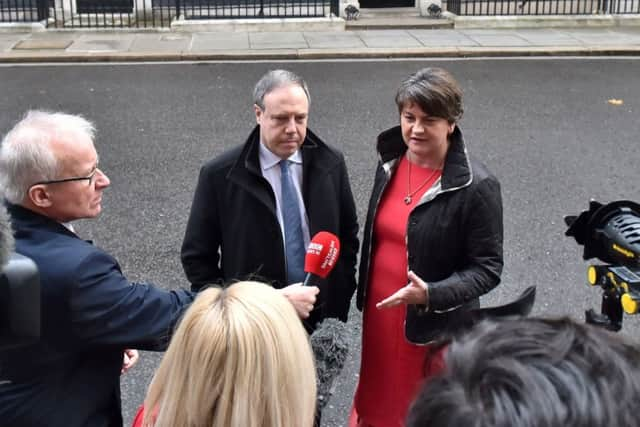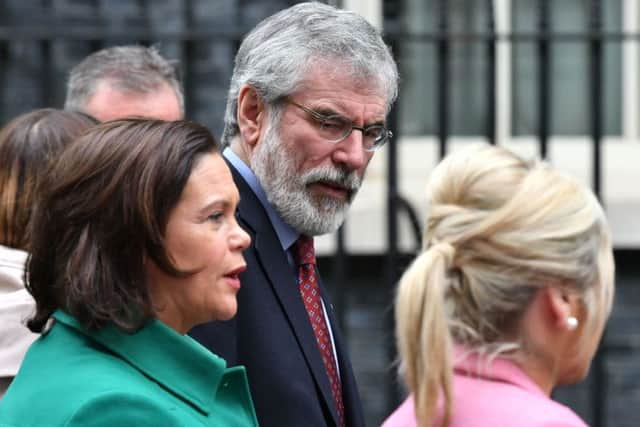Government to float Troubles prosecution amnesty for security force members


The statute of limitations proposal has been inserted into an as yet published public consultation document on potential mechanisms for dealing with the toxic legacy of the Troubles.
The move has angered Sinn Fein, which has accused the Government of an “act of bad faith”.
Advertisement
Hide AdAdvertisement
Hide AdA range of mechanisms to deal with the conflict legacy were agreed by Northern Ireland politicians in the 2014 Stormont House Agreement - an amnesty was not among them.


The agreed proposals, including a new independent investigatory unit, a truth recovery body and an oral archive, are on ice due to a small number of outstanding disputes.
One of the main bones of contention is the thorny issue of national security and republican fears the Government would cite that as a reason to withhold documents to bereaved families.
The impasse over the legacy bodies predates the current powersharing impasse at Stormont and, in an attempt to move the process on, Northern Ireland Secretary James Brokenshire has proposed conducting a consultation exercise to establish the wider public’s view.
Advertisement
Hide AdAdvertisement
Hide AdIt was anticipated the exercise would focus on the Stormont House Agreement mechanisms, but Sinn Fein emerged from a meeting with the Prime Minister on Tuesday angered that a statute of limitation proposal had been added to the document.


Sinn Fein President Gerry Adams claimed neither his party or the Irish government had been consulted about the insertion.
“We understand there is now a new section which is about an amnesty for British Crown forces and that is an act of bad faith,” he said outside No 10.
“We weren’t told this, we understand the Irish government weren’t told this.
Advertisement
Hide AdAdvertisement
Hide Ad“So how on earth can a British prime minister seek to persuade anybody that there’s the possibility of a new dispensation emerging when she takes up this position and when her secretary of state takes up this position also.”


A Northern Ireland Office spokesman said the Government believed Stormont House Agreement proposals still represented the “best means” to address the legacy of the conflict.
However, he said for it to be an “open and meaningful consultation” it was right that the public had its say on alternative approaches, such as the statute of limitations proposal.
Over the last year, the concept of an amnesty has gained traction among some unionist politicians and Tory backbenchers, who claim recent prosecutions of former British soldiers are tantamount to a “witch-hunt”.
Advertisement
Hide AdAdvertisement
Hide AdProsecutors and police in Northern Ireland insist such allegations simply do not stand up to scrutiny, with a breakdown of figures showing no disproportionate focus on ex-security force members.


Prior to the general election, Westminster’s Defence Committee recommended that the last government introduce a statute of limitations.
The spokesman from the Northern Ireland Office said: “The Secretary of State believes that the next phase is to consult publicly on the details of how the new institutions would work in practice.
“A public consultation would provide everyone with an interest the opportunity to see the proposed way forward and contribute to the discussion on the issues.
Advertisement
Hide AdAdvertisement
Hide Ad“The Government believes that the Stormont House Agreement proposals represent the best means of addressing Northern Ireland’s past in ways that will be fair, balanced and proportionate.
“However, we acknowledge that others have different views on the best way forward, such as those proposed by the House of Commons Defence Committee, which do not involve recourse to the criminal justice system.
“In the spirit of open and meaningful consultation, it is right that the Government listens to all views.
“The consultation has not been launched at this stage, but the Government will be engaging with stakeholders in advance.
Advertisement
Hide AdAdvertisement
Hide Ad“We are obliged to move forward so that victims and survivors are able to get the progress they have been seeking for such a long time.
“The best way to do that is following the formation of an Executive, but if that does not prove possible we do need to get on with this.”
Amnesty International said the Government “must not legislate for impunity” through a statute of limitations.
Patrick Corrigan, Amnesty International’s Northern Ireland programme director, said: “The idea of a time bar on investigations of crimes committed by soldiers during the Northern Ireland conflict appears to be gaining ground in Westminster.
Advertisement
Hide AdAdvertisement
Hide Ad“Such a move would, in effect, be the granting of a blanket amnesty for human rights abuses committed by former members of the security forces in Northern Ireland and would be an utter betrayal of victims’ fundamental right to justice.
“Any such move by the UK Government would fly in the face of international human rights standards and perpetuate impunity.”